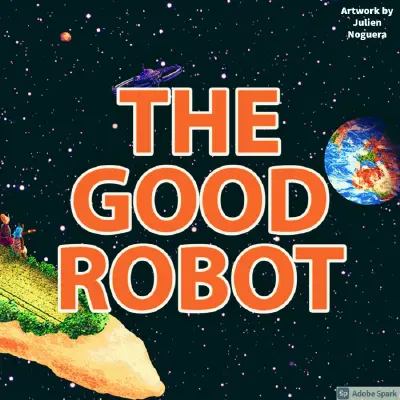Podcasts about Artificial Intelligence
Episodes about Artificial Intelligence

Take a deep breath and join Alex and Emily in AI Hell itself, as they take down a month's worth of hype in a mere 60 minutes.This episode aired on Friday, May 5, 2023.Watch the video of this episode on PeerTube.References:Terrifying NEJM article on GPT-4 in medicine“Healthcare professionals preferred ChatGPT 79% of the time”Good thoughts from various experts in responseChatGPT supposedly reading dental x-raysChatbots “need” therapistsCEO proposes AI therapist, removes proposal upon realizing there’s regulation:https://twitter.com/BEASTMODE/status/1650013819693944833 (deleted)ChatGPT is more carbon efficient than human writersAsking disinformation machine for confirmation biasGPT-4 glasses to tell you what to say on dates, "Charisma as a Service"Context-aware fill for missing data“Overemployed” with help from ChatGPTPakistani court uses GPT-4 in bail decisionChatGPT in Peruvian and Mexican courtsElon Musk’s deepfake defenseElon Musk's TruthGPTFake interview in German publication revealed as “AI” at the end of the articleYou can check out future livestreams at https://twitch.tv/DAIR_Institute. Follow us!Emily Twitter: https://twitter.com/EmilyMBender Mastodon: https://dair-community.social/@EmilyMBender Bluesky: https://bsky.app/profile/emilymbender.bsky.social Alex Twitter: https://twitter.com/@alexhanna Mastodon: https://dair-community.social/@alex Bluesky: https://bsky.app/profile/alexhanna.bsky.social Music by Toby Menon.Artwork by Naomi Pleasure-Park. Production by Christie Taylor.

In this episode, we talk to Mar Hicks, an Associate Professor of Data Science at the University of Virginia and author of Programmed Inequality: How Britain discarded Women Technologists and Lost its Edge in computing. Hicks talks to us about the lessons that the tech industry can learn from histories of computing, for example: how sexism is an integral feature of technological systems and not just a bug that can be extracted from them; how techno-utopianism can stop us from building better technologies; when looking to the past is useful and when it's not helpful; the dangers of the 'move fast and break things' approach where you just build technology just to see what happens; and whether regulatory sandboxes are sufficient in making sure that tech isn't deployed unsafely on an unsuspecting public.

Aug 11, 2023
E141: State of Series A's, VC dry powder, IPO window opens + more with Bill Gurley & Brad Gerstner
All-In with Chamath, Jason, Sacks & Friedberg ❭
(0:00) Bestie intros: Friedberg's bad haircut (1:17) Welcome BG^2! Biography recommendations and film talk (22:27) VC market update: State of Series A's (33:43) Dry powder misconceptions, marking incentives (48:57) IPO window starting to open, IPO down rounds, incentives to go public (1:03:17) Cyclical venture cycles, managing distributions, benchmarking VC performance vs public market (1:22:26) Tragic Maui wildfires, extreme temperatures (1:26:11) Macro picture: inflation cools, deflation risk? Follow the besties: https://twitter.com/chamath https://linktr.ee/calacanis https://twitter.com/DavidSacks https://twitter.com/friedberg https://twitter.com/altcap https://twitter.com/bgurley Follow the pod: https://twitter.com/theallinpod https://linktr.ee/allinpodcast Intro Music Credit: https://rb.gy/tppkzl https://twitter.com/yung_spielburg Intro Video Credit: https://twitter.com/TheZachEffect Referenced in the show: https://youtu.be/xmYekD6-PZ8 https://www.amazon.com/Setting-Table-Transforming-Hospitality-Business/dp/0060742755 https://www.amazon.com/Steve-Jobs-Walter-Isaacson/dp/147770146X https://www.amazon.com/Elon-Musk-Spanish-Walter-Isaacson/dp/B0CBTHK86N https://www.amazon.com/Good-Great-Some-Companies-Others/dp/0066620996 https://www.amazon.com/Man-Arena-Selected-Writings-Roosevelt/dp/0765306700 https://www.amazon.com/Shoe-Dog-Memoir-Creator-Nike/dp/1501135910 https://www.amazon.com/Alexander-Hamilton-Ron-Chernow/dp/1594200092 https://www.amazon.com/Something-Autobiography-Vintage-Akira-Kurosawa/dp/B0C3D5NDJX https://www.amazon.com/Born-Standing-Up-Comics-Martin/dp/B017QUU3EO https://www.amazon.com/Writing-Memoir-Craft-Stephen-King/dp/1439193630 https://www.amazon.com/Autobiography-Malcolm-told-Alex-Haley/dp/0345379756 https://www.linkedin.com/posts/peterjameswalker_cartadata-seriesa-valuations-activity-7092542118803488768-vOcY https://www.theinformation.com/articles/venture-firms-still-writing-small-checks-despite-271-billion-in-dry-powder https://twitter.com/bgurley/status/1688605654188224512 https://finance.yahoo.com/chart/SN https://www.google.com/finance/quote/CAVA:NYSE https://finance.yahoo.com/quote/SRFM https://twitter.com/altcap/status/1686086247029055489 https://www.wsj.com/articles/university-endowments-mint-billions-in-golden-era-of-venture-capital-11632907802 https://www.youtube.com/watch?v=Hhy7JUinlu0 https://twitter.com/gokulr/status/1680006171149869056 https://www.statista.com/statistics/277501/venture-capital-amount-invested-in-the-united-states-since-1995 https://www.bls.gov/charts/consumer-price-index/consumer-price-index-by-category-line-chart.htm https://www.bloomberg.com/news/newsletters/2023-08-10/disinflation-wave-the-bloomberg-open-americas-edition https://www.nytimes.com/2023/08/09/business/china-economy-inflation.html https://twitter.com/KobeissiLetter/status/1689010884062904320